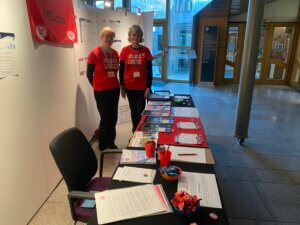Leading scientists, organisations and patients around the world have responded to the US National Institutes of Health’s (NIH’s) Request for Information to guide its research strategy on ME/CFS. It is the first time that the NIH has asked for public input on the disease.
The request, made in May, drew public responses from Dr. Ronald W. Davis of Stanford University, Dr. W. Ian Lipkin of Columbia University, advocates Jennie Spotila and Mary Schweitzer, and the European ME Alliance. Other groups, including the Solve ME/CFS Initiative and the Massachusetts CFIDS/ME & FM Association, announced that they were also making submissions.
Dr. Davis wrote on behalf of the Chronic Fatigue Syndrome Research Center at Stanford University, of which he is the director. He told the NIH, “The methods we need to understand this complex disease may very well not exist yet” and recommended the development of technology for “highly sensitive, quantitative molecular profiling and/or measuring novel cellular properties, as well as novel computational analyses that integrate multiple datatypes to define disease mechanisms”.
He said, “All data should be made publicly available as early as possible, even before publication”.
Dr. Lipkin described the collaborative work he had done with Drs. Lucinda Bateman, Mady Hornig, Nancy Klimas, Anthony Komaroff, Susan Levine, Eugene Major, Jose Montoya, Daniel Peterson and Beth Unger, and listed what he saw as the highest-priority gaps in knowledge.
Dr. Lipkin wrote, “Given the reticence of the medical community to accept ME/CFS as a biological illness, it is no surprise that medical schools do not include ME/CFS in their curricula”. The group’s recommendations included the setting up of a two-year, Master’s-level, multi-speciality training program for physicians to enable them to treat ME/CFS patients, and of a clinical trials unit for ME/CFS.
#MEAction is also submitting a report based on responses from over 1,800 patients, clinicians, caregivers and other stakeholders, and will report on their findings soon.

Support Keeping Telehealth – Take Action Today!
Expanded telehealth is set to expire at the end of this year, December 31st! Learn More #MEAction knows losing expanded telehealth will be a problem for many in our community and the wider disability community. Telemedicine increases access to care, improves health equity, and is more affordable than in-person care. We are asking you to





2 thoughts on “Advocates and scientists respond to NIH’s Request for Information”
Formerly the Fatigue Consultation Clinic (FCC) and the Organization for Fatigue & Fibromyalgia Education & Research (OFFER), the Bateman Horne Center of Excellence (BHC), was formed in 2015 as a 501(c)3 nonprofit organization and is led by Lucinda bateman, MD and Suzanne D Vernon, PhD. They also prepared a response, which you can read here: https://batemanhornecenter.org/nih-rfi/
Thank you, Leigh!
Comments are closed.